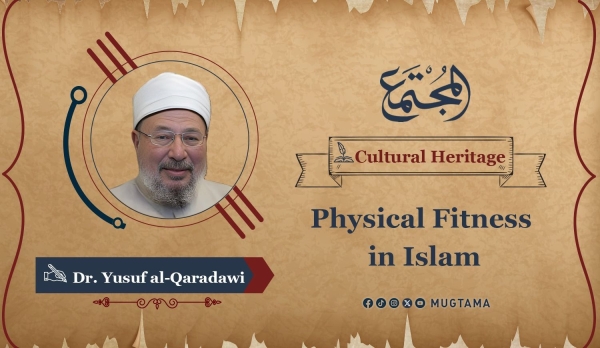Islam came as a comprehensive and balanced religion, organizing both worldly and spiritual affairs, caring for both the individual and society. It pays attention to the individual’s soul, body, and mind, desiring a Muslim who is strong in body, intellect, and faith. “A believer who is strong (and healthy) is better and dearer to Allah than the weak believer.”
While some religions neglect the human body and focus only on the soul, with some even advocating self-torture to purify the soul and elevate it, prohibiting the body from enjoying lawful sustenance and adornments, the Quran opposes this notion, stating: "O children of Adam, take your adornment at every masjid, and eat and drink, but be not excessive. Indeed, He likes not those who commit excess. Say, 'Who has forbidden the adornment of Allah which He has produced for His servants and the good [lawful] things of provision?'" (Al-A'raf: 31-32).
Who has forbidden these adornments and lawful provisions for people? Islam came to care for the human body, and people heard for the first time in a religious context the prophetic words: “Your body has a right over you.” The right of your body includes strengthening it when it weakens, cleansing it when it becomes dirty, resting it when it is tired, and treating it when it is ill. Furthermore, you must protect it from diseases as much as possible.
This is how Islam seeks to build a strong nation, and a nation can only be strong if its individuals are strong. A society is composed of individuals just as a building is made of bricks. Can a strong building be built from weak, hollow bricks? Certainly not. This is why Islam is keen on forming righteous individuals who are strong in every aspect, including physical strength.
Elements of Physical Education in Islam
Islam seeks to nurture a person physically based on fundamental elements:
Health, well-being, and freedom from disease – A person should be healthy in body, as the Prophet ﷺ said: “Whosoever begins the day feeling family security and good health; and possessing provision for his day is as though he possesed the whole world.” Good health is one of the primary components of a peaceful and stable life.
The Prophet ﷺ would ask Allah for wellness, saying: “The best thing a person can be given is faith and well-being.” He would also supplicate in his qunut prayer: “O Allah, guide me among those whom You have guided.” And between the two prostrations, he would say: “O Allah, forgive me, have mercy on me, guide me, support me, grant me well-being, and provide for me.” Seeking well-being is essential, so ask Allah for pardon, well-being, and protection in both this life and the Hereafter.
Islam Does Not Reject Sports but Rejects Excessiveness
In our era, sports have evolved into sciences and arts, with specialized institutions teaching people how to train their bodies. In the past, people walked miles to fulfill their needs, but today, they ride vehicles for even the shortest distances. As a result, physical exercise has become a necessity for maintaining strength.
Islam does not oppose this. Any sport is permissible as long as it does not involve excessiveness. Excessiveness ruins everything; when something exceeds its proper limit, it turns into its opposite. It is acceptable for people to play football, volleyball, basketball, or tennis. However, it should not lead to division and fanaticism, where people form factions opposing each other, and sports become an idol that is worshipped—this is unacceptable.
Moreover, sports are not exclusive to men; women can also participate, but within the boundaries of Islamic guidelines and ethical standards. We are not a lawless nation; we are not like the West. Westerners have their own ways, and we have ours. They have no restrictions, but we, if we want to teach women sports, must ensure it is done in female-only spaces.
On the other hand, Westerners adhere to a particular philosophy. Modern Western civilization is built on two fundamental principles: materialism in thought and permissiveness in behavior. We reject both. We reject materialism because we believe in Allah as our Lord, Islam as our religion, and Muhammad ﷺ as our Prophet. We reject permissiveness because we uphold the values and ethics of our religion.
Westerners consider adultery to be normal —even homosexuality, to the point that they no longer call it deviant but rather a legitimate lifestyle. They argue, Why shouldn't people benefit from each other? Why shouldn’t a man enjoy a woman? In fact, why shouldn't a woman enjoy another woman and a man enjoy another man?
O Westerners, “To you is your religion, and to me is my religion.” If we follow in their footsteps, they will never stop at any limit. You may offer them alcohol in the name of openness and encouragement, but they will not be satisfied with just that. They will say, Alcohol is incomplete without a woman—where is the companion? You may comply and provide them with a woman from their own society—imported from Europe or America. But then, they will take another leap and demand women from your own people. They will not be satisfied with Western women alone; they will seek a new taste, a new experience, a different color.
Do not be surprised by this. When evil is unleashed, its harm knows no bounds.
This is why we must stand firm against corruption, awaken the heedless, remind the forgetful, and educate the ignorant. We must not allow ourselves to be swept away by what displeases Allah. By Allah, we will neither find happiness in this world nor honor in the Hereafter, nor will we achieve our aspirations unless we firmly hold onto this religion—the unbreakable bond.
-------------------------------------------------------------
- Friday Khutbah By Sheikh Yusuf al-Qaradawi







